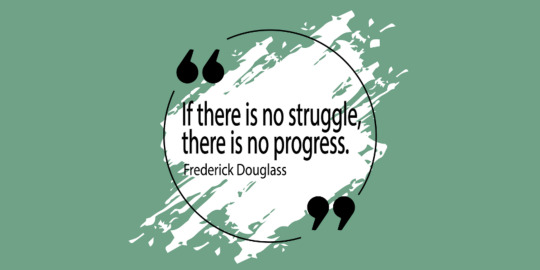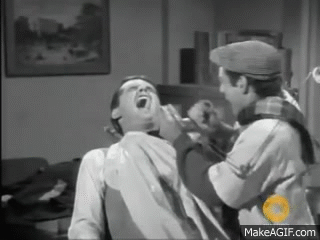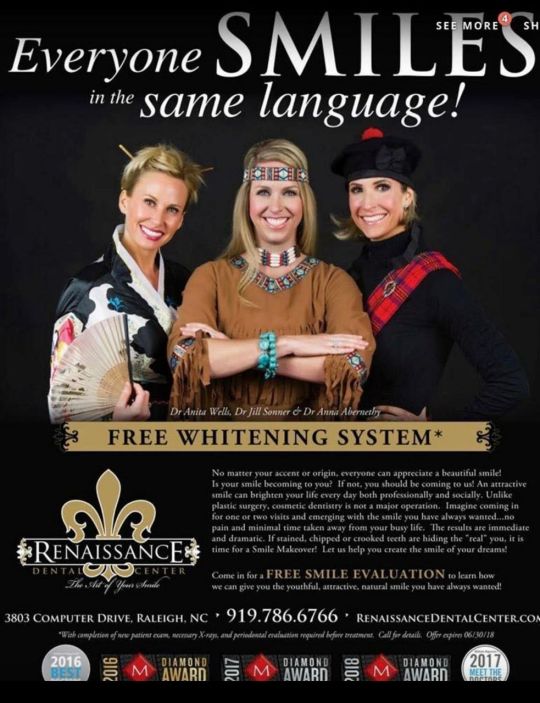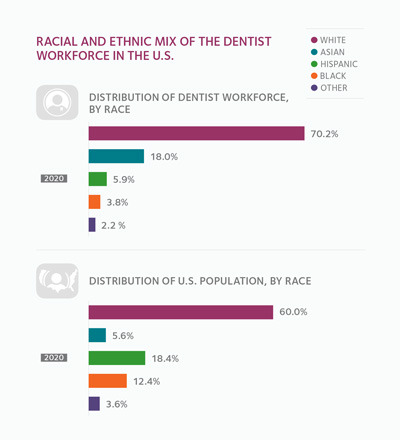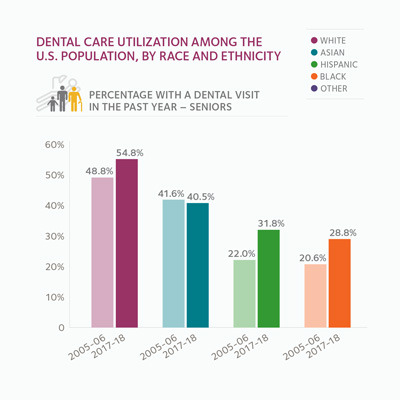Text
Introduction
As a child of two parents who are both first generation, healthcare was rarely accessible and was seen as a privilege to even have. My siblings and I were fortunate enough to have our semi-annual check ups at the dental office before the age of 10 but my dad did not have his first visit until he was in his 40s. Both of my grandparents have been using dentures because by the time they were able to afford to go to the dentist, most of their teeth had gone bad and they were barely in their late 50s to early 60s. For the longest time, I was afraid to go to the dentist because of the results my grandparents had until I started seeing dentists who were of similar ethnicity as me as well as female so I changed my attitude towards the industry. Although I have changed my view on the field, that does not mean everyone else still feels the same and many patients could still be silently being mistreated.
You may be asking, why is racism in the dental field more important than other fields? No field is more important than the other, the main factor is to highlight racism in general and how it can have effects on the health of people in our society. By addressing racism within the dental profession and promoting equity in access to care, it is possible to work towards achieving better oral health outcomes for all individuals, regardless of race or ethnicity.
0 notes
Text
Purpose of Research
I chose to highlight racism as I feel that it is not highly discussed within the dental field. Racism in dentistry, like in many other fields, is a complex and multifaceted issue that involves systematic disparities, biases, and unequal access to oral healthcare services. While the dental profession is committed to promoting oral health for all individuals, regardless of their background, race, or ethnicity, there have been instances where racial disparities and discrimination have been observed.
0 notes
Text
Why is it important to discuss this?
Health Disparities: Minority communities often receive lower quality care, leading to poorer health outcomes compared to their white counterparts.
Quality of Care: These biases may lead to misdiagnosis, inadequate treatment, or delayed care, all of which can have detrimental effects on patient health.
Trust and Patient-Provider Relationships: When patients feel discriminated against or misunderstood by their healthcare providers, they are less likely to seek care or follow medical advice, leading to further health complications.
Cultural Competence: By engaging in discussions about racism, healthcare professionals can develop the skills necessary to provide more effective, patient-centered care to diverse populations.
Ethical Imperative: Ignoring racism in healthcare perpetuates injustice and violates the ethical principles of beneficence and justice.
All in all, discussing racism in healthcare is not only important for addressing current disparities and biases but also for fostering a healthcare system that is equitable, inclusive, and respectful of all individuals.
0 notes
Text
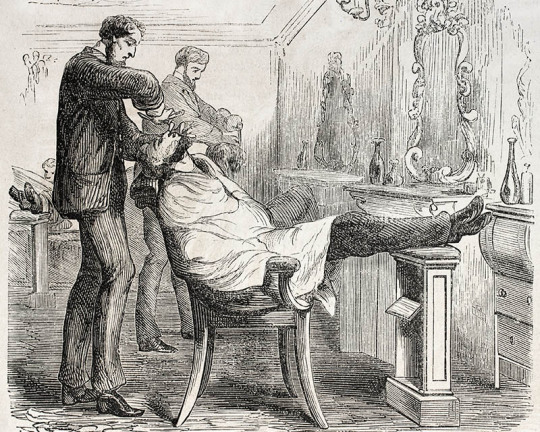
Intro to Dentistry
Dentistry is one of the oldest medical professions with history going back to 7000 B.C., but it wasn’t until the 1700s were it became more prominent in society specifically in the United States. Dentistry was often practiced by barbers or general physicians. Treatments were often crude, including tooth extractions and the use of various herbs and potions for pain relief and oral hygiene.
0 notes
Text
Dental Education
Historically, BIPOC individuals faced significant barriers to accessing dental education. Segregation and discriminatory admissions policies in dental schools limited opportunities for aspiring BIPOC dentists. Even after the abolition of explicit segregation, systemic inequalities persisted, affecting admission rates and access to resources for minority students. BIPOC students in dental schools have often reported experiencing racism and discrimination within the educational environment. This can manifest in various ways, including biased treatment from faculty and peers, lack of mentorship opportunities, and feelings of isolation or marginalization.
Another aspect of racism in dental education relates to the curriculum and the extent to which it addresses issues of diversity, equity, and inclusion. Historically, dental curricula may have overlooked or marginalized topics related to cultural competence, health disparities, and the unique oral health needs of diverse populations.
0 notes
Text
"They were unsure about how to respond to stereotyping or racism from staff because of perceived imbalances in the staff-patient-student triad relationship. They expressed fears of gaslighting and despondency. They also felt that the COVID-19 pandemic and anonymity from virtual learning environments enabled racist behavior” (Ahmadifard et al. 1).
0 notes
Text
“A recent revelation made us aware of a noose appearing in a PowerPoint presentation for seven years, which is disturbing. … This professor has continued to teach without any response or action from the university. Students of color have reportedly continued to be targeted at the university from being asked about their ‘natural hair’ to being called the N-word.”
0 notes
Text
“Recommendation for root canal treatment (RCT) in the White patient condition was significantly higher than in the Black patient condition. Overall, participants were significantly more likely to recommend root canal treatment to White patients and significantly more likely to recommend extraction for Black patients” (Patel et al. 1).
0 notes
Text
National Institutes of Health reported,
over one‐third of the participants reported at least one instance of racism in oral healthcare settings, with “not being listened to” due to their race or color as the most frequent issue (24.4%) (https://www.ncbi.nlm.nih.gov).
0 notes
Text
"Black dentists often make less money than their white colleagues, have more stressful jobs, work more hours, have clients with more severe oral health issues, and even face discrimination from white patients. To overcome the systemic challenges that have created this situation, many dentists—especially white dentists—are now asking what they can do to change this".
0 notes
Text
"Although severely underrepresented in the profession, Black and Hispanic dentists are twice as likely compared to White dentists to treat Medicaid beneficiaries. Unfortunately, due to the historically inequitable structure of oral health care in the United States, dental decay although widely preventable is still the leading chronic disease of early childhood and access to dental care is limited for the millions of children — disproportionately children of color — who rely on Medicaid and the Children’s Health Insurance Program"
- Dr. Brigitte White
0 notes
